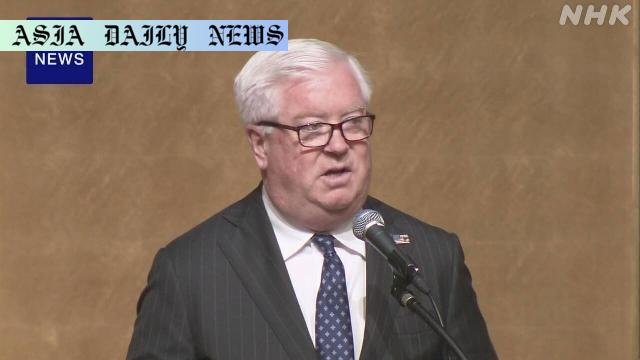US-Japan Alliance remains unfaltering amidst tariff negotiations, with shared focus on Indo-Pacific security and bolstering defense strategies.
The US-Japan alliance remains robust despite ongoing tariff negotiations.
Ambassador Glass emphasizes deterring China’s aggression for regional stability.
The US encourages Japan to strengthen defense capabilities in light of Indo-Pacific security challenges.

Introduction to US-Japan Alliance
The relationship between the United States and Japan has been one of mutual trust and strategic alignment for decades. As close allies in Asia-Pacific, their collaboration spans across economic, defense, and regional stability domains. Recently, US Ambassador to Japan George Glass highlighted the unwavering strength of this alliance, even amidst ongoing tariff negotiations. His speech in Tokyo served not only as a reassurance but also as a vision for cooperative growth amid shared challenges emerging from an evolving geopolitical landscape.
Tariff Discussions: Unfaltering Bonds
Ambassador Glass explicitly refuted claims that trade negotiations over tariffs could jeopardize the bilateral alliance. Instead, he affirmed that the strong bond between the two nations was “greater than any one set of trade talks or defense negotiations.” This sentiment underscores that economic discussions remain a stepping stone rather than a hurdle within their overall partnership. Glass’s statements indicated confidence in the resilience of the decades-long US-Japan alliance that has consistently adapted to new global realities.
Regional Security Challenges in the Indo-Pacific
The Indo-Pacific has become the center of strategic focus for both the United States and Japan due to increasing Chinese activities near Taiwan and the South China Sea. Glass reiterated the importance of deterring aggression by China’s Communist Party to maintain a “free and open Indo-Pacific.” This region, which includes significant trade routes and geopolitical influence, has seen a rise in territorial tensions. For both nations, preserving stability in these waters is critical, with Japan serving as a pivotal ally in the region.
Bolstering Defense Collaborations
Given the aforementioned challenges, the United States is keen on seeing Japan enhance its defense stance. Ambassador Glass suggested that strengthening capabilities isn’t just beneficial for Japan but for the allied effort to ensure peace and protection of mutual interests. Japan has already taken significant strides towards bolstering military readiness, and this path aligns with the US’s broader Indo-Pacific strategy. These defense investments are viewed as essential to ensuring the region continues to operate freely, blocking any unilateral attempts to alter its dynamics.
Alliance Beyond Economies and Defense
What truly sets the US-Japan alliance apart is its multifaceted nature stretching beyond pure economic interests or defense capabilities. From cultural exchanges and technology collaborations to policymaking in global institutions, the partnership continuously evolves. With constant dialogue ensuring mutual respect and understanding, the resilience shown amid specific issues like tariffs becomes emblematic of the mutual foresight both countries share.
Conclusion
The recent comments by Ambassador Glass serve as a powerful reminder of the strength and flexibility of US-Japan ties. Despite tariff negotiations and other challenges, the two nations continue to look forward hand in hand, particularly in shared objectives such as deterring aggression from China and ensuring regional stability in the Indo-Pacific. As the world becomes more interdependent, this partnership stands as a prime example of two nations collaborating for mutual goals while preserving their robust alliance.



Commentary
The Value of Strategic Alliances
The US-Japan alliance provides a fascinating example of how countries with differing histories and geographies can come together for mutual benefit. This partnership is built on trust, shared values, and strategic foresight that continues to adapt to a rapidly changing world. Ambassador Glass’s comments underscore the sense that strong alliances don’t just happen in clear skies; they are tested and proven during stormy times, such as bilateral trade issues or rising regional security threats.
Indo-Pacific: A Crucial Region
The Indo-Pacific has emerged as a significant arena in global geopolitics, and it is encouraging to see nations like Japan and the United States prioritizing its stability. Deterring aggression in this region is not merely about maintaining peace but ensuring that core global trade routes and democratic principles are not compromised. With China’s assertive policies in this region becoming more evident, the robust US-Japan cooperation serves as a cornerstone towards upholding international law and freedom on the seas.
The Broader Relevance
While bilateral tariff negotiations are tangible and specific, their implications for wider geopolitics should not be underestimated. Glass’s reassurances about the strength of the US-Japan alliance are comforting but also a call for vigilance. Partnerships like these remind observers worldwide about the importance of alliances grounded not just in mutual gains but in principled decisions.
Conclusion
The US-Japan relationship is a testament to what can be achieved when nations choose cooperation over division. These ties not only bolster both countries but also contribute to broader stability in regions like the Indo-Pacific. The continued progress of this partnership reflects the enduring power of shared visions and mutual respect in forging stronger global alliances.